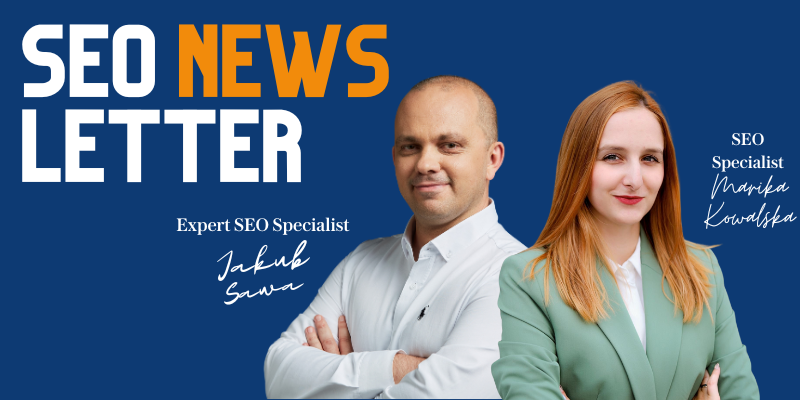We’re experiencing a slight overload of content around AI, so we’re removing the section dedicated to AI, although individual materials will still appear occasionally (e.g., a webinar on AI in journalism work). This is a newsletter about SEO, not AI. 😉
Most Important SEO News (April 26, 2023)
- Conducting tests in the SEO industry is meant to show us, based on statistical data, the effects of specific actions. But what about small client sites with much fewer data? Forecasting comes to the rescue, as discussed in more detail by Lidia Infante on her blog.
https://www.lidia-infante.com/… - Would it be possible to assess e-commerce in 7 SEO audit points? Louis Smith shows that it is, and its implementation can bring surprising results.
https://www.linkedin.com/posts… - Local SEO is becoming an increasing challenge for service providers. Growing competition and its promotion online make it harder to achieve top positions. However, you can use low-code SEO solutions that focus more on tool knowledge rather than coding skills. In the article, you’ll also find three fundamental elements that Miriam Ellis believes are essential for success in local efforts.
https://www.wix.com/seo/learn/… - Rob Hoffmann decided to compare old SEO practices with how SEO looks today on his profile. What should we focus on in 2023? It’s no surprise that social media and useful content for users are mentioned. What do we leave behind? Above all, keyword stuffing and a significant increase in links in a short time.
https://www.linkedin.com/feed/… - The spring edition of Brighton SEO has just concluded, featuring many exciting presentations. I was captivated by the topic discussed by Lidia Infante, who touched on Headless SEO – a technical subject. On her profile, you’ll find a link to the full material, which explains what Headless CMS is and how to use its potential in SEO efforts.
https://www.linkedin.com/feed/… - On Aleyda Solis’ channel, there’s a recent recording about conducting an audit for large websites. Together with two other specialists, she discussed when we can say a site is large and which tools to use for such analyses.
https://www.youtube.com/watch… - How to position a WordPress site effectively? First, remember technical optimization, which is gaining increasing importance in the industry. In the SEL article, you’ll find nine essential tips for technical SEO, including effective actions related to Core Web Vitals and organizing pages with 4xx and 5xx errors.
https://searchengineland.com/t… - When conducting an audit, specialists often try to find all subpages ranking for a specific keyword or simply check how many subpages have been indexed. How can you verify all addresses with certainty? Among other methods, using Google search operators and crawling the site. However, these aren’t the only available ways.
https://www.link-assistant.com… - How to explain to a company that investing in SEO is worthwhile because it affects not only the entire marketing, but also the overall business prosperity? How to show that considering each element from an SEO perspective makes sense? Helen Pollitt addressed this difficult topic during her presentation at Brighton SEO and elaborated on it again for SEJ readers. We highly recommend this article as a collection of arguments to convince organizations of the merits of SEO-First Thinking.
https://www.searchenginejourna… - After Google announced that factors such as Core Web Vitals and Mobile Friendly would be removed from the list of ranking factors, there was an uproar among specialists. The introduced changes would suggest that we focus too much on well-known parameters instead of taking care of the overall value of the site. Does this mean that the removed factors never mattered for SEO actions? In my opinion, that’s too far-reaching. However, it may turn out that since four factors have been removed, entirely new ones will soon take their place.
https://www.seroundtable.com/g…
SEO Experts recommend:
- Google has updated information on its ranking systems, removing four of them: Page experience system, Mobile-friendly ranking system, Page speed system, secure sites system. As John Mueller explained: “We’ve seen people hyper-focus on these numbers, that’s not a good use of time & energy.”
https://www.seroundtable.com/google-retired-ranking-systems-removals-35264.html
Reports related to page experience will also be updated in Google Search Console.
https://www.seroundtable.com/google-search-console-page-experience-report-mobile-friendly-deprecated-35259.html
In my opinion, many people, especially those outside the industry, place too much emphasis on the impact of these factors on a site’s position in search engines. In practice, they didn’t matter much, as confirmed by Google’s recent actions. Of course, I believe that page experience issues are important, but primarily for the user, not for positioning. From an SEO perspective, it’s better to focus on other elements. - Google has released a new bot called “GoogleOther”. According to the information they provided, it is supposed to relieve Googlebot by taking over some of its tasks. This could, among other things, mean improved indexing speed.
https://searchengineland.com/google-launches-new-googlebot-named-googleother-395827 - I think this is good news for the SEO industry, as additional resources for Googlebot can speed up site scanning. In particular, I am counting on improved indexing speed, as there has been a significant problem with this for quite some time. Currently, without taking additional measures to speed up indexing, some sites are indexed very slowly, and this primarily affects site owners who do not have extensive SEO knowledge. Using AI to create content for SEO needs is still a hot topic. Google has informed that they don’t care whether the content author is a human or AI, more cases are appearing, and new tools are constantly being developed. However, none of the tools I’ve come across met my expectations, so we’ve released our tool that allows you to use GPT-4 to create SEO texts. After the initial tests and consultations with clients, the results turned out to be surprisingly positive. Personally, I believe that AI can easily take over a significant portion of texts written for SEO purposes.
https://copymate.app
Marek Foltański, SEO expert LinkedIn
